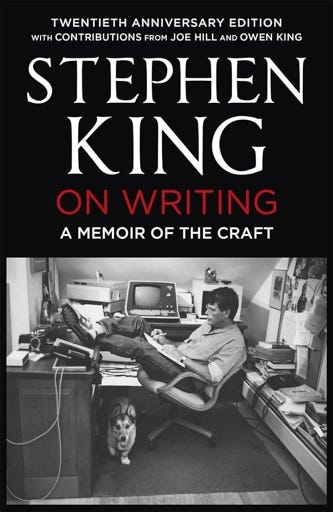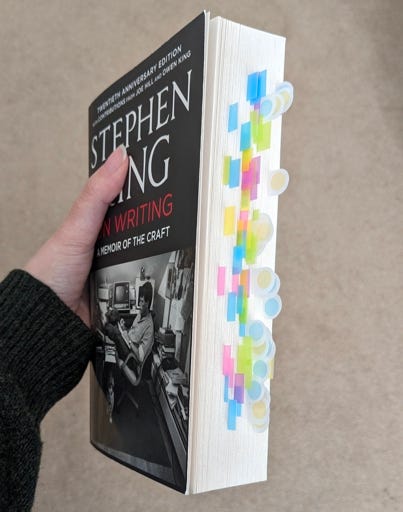
My Rating: ★★★★☆
Intro & Summary
Stephen King’s On Writing: A Memoir of the Craft is just that: part memoir, part masterclass on what King believes to be important to writing and writing well. I’ve heard people recommend this book, and I feel like I’ve heard plenty more people say it’s more worthwhile to skip it. But I finally decided that, while I don’t like horror, I like King's writing and admire his prolific catalogue of works. I wanted to know what he had to say.
First published in 2000, my copy is the 2020 edition. The main text itself hasn’t been updated since it was written in the late ‘90s, but there are now 3 forewords, 4 “Furthermores” (3 of which are lists of books King has read over the years) and 2 contributions involving his sons, one an essay and one an interview with King. It’s an interesting way to keep a volume up to date, but it works.
King, Stephen. On Writing : A Memoir of the Craft. 2000. Reprint, London: Hodder, 2003.
Readability
I have read a grand total of one Stephen King book, at least until I finished On Writing. As mentioned above, I’m not a fan of horror. But I took two classes on vampires in literature in college, and for one of those classes I had to read ‘Salem’s Lot.
From this one book, I both confirmed I still wasn’t into horror and that Stephen King is a good storyteller. His style manages to be both descriptive and straightforward. You could imagine someone telling you the story in person, but it would be a performative storytelling, not just a description of what happened last weekend.
King brings this storytelling style to both parts of this book, and that made for a fun and engaging read. For other books I’ve read so far this year, I kept a notebook beside me to take notes. This book kept me so engrossed I couldn’t tear myself out and interrupt the flow to write notes, so I used coloured tabs instead: blue for writing advice, yellow for more general creative advice and pink for funny anecdotes that made me giggle. I tabbed over 70 things, including one whole chapter that served as a bridge between the memoir and instructive portions.
None of the book was boring, but I did find myself skimming through the last third or so of the memoir portion. It was neat to learn about King’s life and the events that led him to where he ended up at the point he wrote this book. But I wanted to get to the writing stuff! That’s what I was really here for.
Learning
I think I know why so many people agree On Writing “isn’t worth it.” Nothing in this book is prescriptive, and most of it isn’t even very direct. It’s more about King’s opinion on what he thinks makes good writing, and he’s up front about that. But if you’re looking for an instructive manual telling you what to do and when and how, or if you’re looking for practical exercises, none of that is on offer here. So I get it.
But even as someone who learns best by being shown or having practical, hands-on experience, I really like the approach King adopts here. In his straightforward style, he says what is good or bad for writers to do, and then he explains why he thinks that.
Sometimes it’s because he ascribes to William Strunk’s The Elements of Style (if you’re a writer, you’ve almost certainly heard of it and might even have some strong opinions of your own). Other times, his opinions were formed by what seems to work for him and other authors whose work he enjoyed.
I didn’t agree with King 100% of the time, but I didn’t have to. Even when he directly says “do this” or “don’t do that,” his advice is presented as just that: advice. And advice leaves room to disagree, to form one’s own opinions.
It’s the why that’s most helpful. Knowing why King thinks all adverbs and passive voice should be removed is much more informative to me, as a learner and creative, than him just telling me to get rid of them. The why helps me understand how to apply these “rules” for myself, and also when to break them. Which he also does and explains why.
In these two cases–for example–King asserts that tentative writers use passive voice, and those who use adverbs, especially after speech tags (e.g. “he said haughtily”), do so because they don’t trust what they’ve written to convey tone or emotion any other way. And then he offers both advice and motivation:
You probably do know what you're talking about, and can safely energize your prose with active verbs [instead of passive]. And you probably have told your story well enough to believe that when you use he said, the reader will know how he said it – fast or slowly, happily or sadly. (pg. 143)
After most reading sessions, I put down this book feeling more motivated about my writing than I have in several years. And along with everything practical I learned from Mr. King about passive voice and adverbs and story structure and more, I think the biggest and most important thing I learned is that the writing needs to happen. And that I can do it if I just sit down and work at it.
I knew this already, of course. But sometimes you just need a push from someone else. And King’s push was made stronger by just how encouraging he is. As he says on page 163: “I love this job. I want you to love it, too.” And it shows.
Returning to the idea of practical application, the first Furthermore after the main text was unexpectedly specific compared to the rest of the book. Here, King presents a section of a first draft of a story. There follows the same section but with annotated revisions and markup, which King then explains in his brief and straightforward style. It’s a short section (most of that Furthermore is taken up by the two versions of the draft), but that window into how one writer refines his early attempts demystifies the process in a super helpful way.
Would I Read It Again?
Yes.
I don’t usually have a firm and immediate answer to this question, but this time it’s definitely yes. This book is going to remain on my shelf for a long time, I think, ready for me to pick up and read through again. I’ll probably skip the memoir part and jump right into the half about writing. And I’m definitely going to leave my tabs in place for quick reference.
But whether it’s refreshing on King’s practical advice or just looking for motivation to get back to it, I can definitely see myself reading and rereading On Writing.




